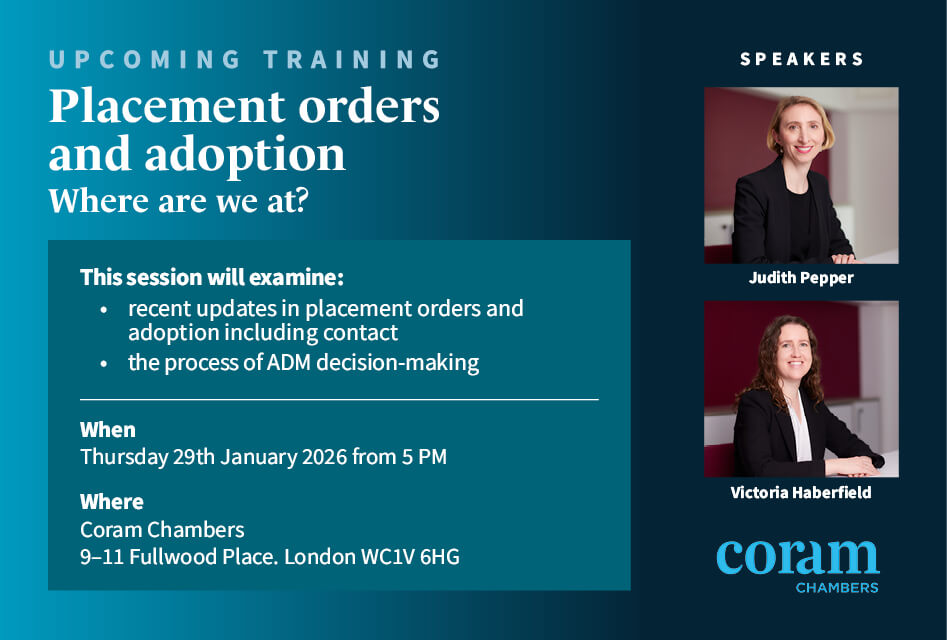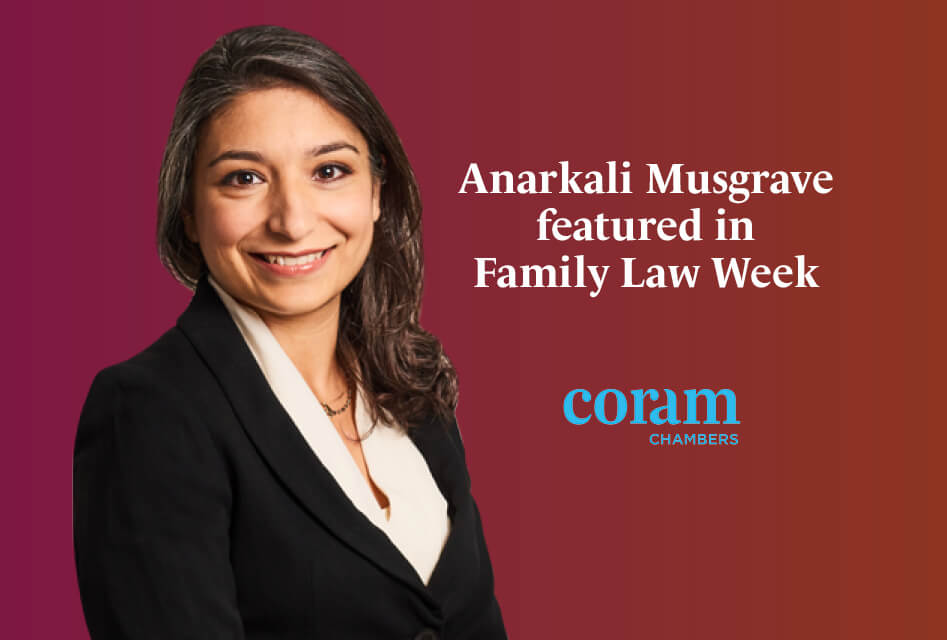
by Ella Shaw, Coram Chambers
It is the nature of public law proceedings that there will often be concurrent criminal law proceedings, with the court being asked to make findings in the former before the latter has gone to trial.
A person who is facing charges in the criminal court may be reluctant to be open and honest about their offences in the family law court, for fear that this will be used against them.
However, there is “no right to remain silent”: pursuant to s.98(1) of the Children Act, a person in family law proceedings cannot be excused from giving evidence on any matter or answering any question put to them in the course of their giving evidence on the ground that doing so might incriminate them or their spouse/civil partner of an offence.
In other words, there is no self-incrimination privilege.
Some relief is provided by s.98(2), which stipulates that if a person does incriminate themselves or their spouse in family law proceedings, it is not admissible in evidence against the person doing so (or their spouse/civil partner) in criminal proceedings except for the offence of perjury.
However, that protection is not absolute. As subsequent legislation and case law has demonstrated, the court can give permission for any information in family law proceedings to be shared with the police, to be used during their investigations.
The police are also entitled to a copy of any fact-finding judgment [Family Procedure Rules 2010, r.12.73].
If a criminal prosecution is pursued, the prosecutor can make an application for permission to ask questions of the alleged offender (or other relevant parties) about what was said in the family law proceedings.
The criminal court would then decide whether to exercise its discretion pursuant to s.78 of the Police and Criminal Evidence Act 1984, with reference to the parties’ Article 6 rights and the circumstances of the case.
The reality, therefore, is that confidentiality cannot be guaranteed when a party in family law proceedings self-incriminates when giving evidence, leaving them open to punishment in the criminal courts.
If you are acting for a client who is the subject of criminal proceedings and there is a risk of self-incrimination, it is important that you explain s.98 to the client and the court should be invited to give the s.98 warning to them before they commence their oral evidence.
I have been involved in a couple of cases recently involving requests for a transfer of jurisdiction pursuant to Article 8 of The Hague Convention 1996. Of course, many transfer of jurisdiction applications to European countries were previously dealt with pursuant to Article 15 of Brussels IIa (Council Regulation (EC) No.2201/2003). Brussels IIa is a European Regulation which has no application to care proceedings begun after the end of the Brexit transition period. Following the UK’s departure from the European Union, jurisdiction in children’s cases involving transfer is now governed by the Family Law Act 1986 and the 1996 Hague Convention.
Once I pieced together and digested the relevant articles of the 1996 Hague Convention, I concluded it is a relatively straightforward argument and process for making a transfer request, if the application is successful. Further once you have drafted one skeleton argument for a transfer application, applying the 1996 Convention, it is easily adaptable for other cases. However, a difficulty I have noted with the 1996 Hague Convention is that unlike Brussels IIa, there is no time limit which can be set for the other Contracting state to respond to the Transfer request.
Article 15 (4) of BIIa provides, “The court of the Member State having jurisdiction as to the substance of the matter shall set a time limit by which the courts of that other Member State shall be seised in accordance with paragraph 1. If the courts are not seised by that time, the court which has been seised shall continue to exercise jurisdiction in accordance with Articles 8 to 14.”
Article 15(5) states ; “The courts of that other Member State may, where due to the specific circumstances of the case, this is in the best interests of the child, accept jurisdiction within six weeks of their seisure in accordance with paragraph 1(a) or 1(b). In this case, the court first seised shall decline jurisdiction. Otherwise, the court first seised shall continue to exercise jurisdiction in accordance with Articles 8 to 14.”
Regrettably there are no similar provisions to set a time limit within the 1996 Hague Convention.
In a case I had in the High Court, the court took little persuading that France was better placed to assess the best interests of the child. However, once the transfer request was made it took several months for the case to be formally transferred. The parties and court were both at a loss to know what to do to speed along the process. In the end a hearing was set with an invite to the Judge or other official of the French Court to attend (remotely) to assist liaison, which must have done the trick as before the next hearing the case was transferred. However, this took just shy of 5 months from the date the transfer request was made. My client, the mother had decided to move back to France following the transfer request, clearly hoping the French courts would accept Jurisdiction very quickly and that her baby would closely follow and be placed in foster care in France. However very sadly, due to the delays, direct contact did not take place for several months, whilst a response was awaited from the French courts.
The next case I did was one in which the lack of time limit for a request to be accepted was problematic involved a Romanian child who it was highly suspected had been trafficked here. She was desperate to return to Romania, even if this meant placement in foster care in Romania. She spoke very little English and had never attended school. The local authority was arranging for her to attend school, but understandably she was very anxious. Given the circumstances of her presence in the UK the court took very little persuading that the child was habitually resident in Romania and made a transfer request. Again, weeks went by with no progress leaving the parties frustrated, and in the end the child did start attending school in the UK.
Eventually 3 months later the Romanian courts declined the transfer request, resulting in months of delay in securing permanence for the child. In that case one option the parties were considering, in order to try and progress a response from the Romanian court, was to ask the judge to liaise with the International Family Justice Office of which the work includes; Liaison with judges in other jurisdictions on international family law issues arising in individual cases, including in cross-border public law (care) cases relating to children, and in international child abduction and relocation cases.
Conclusion
The above two examples demonstrate the delay and detriment caused to children, by the inability of the courts to set a time for a transfer request to be accepted. I am of the view the 1996 Hague Convention should be amended for this very reason and to allow the families involved to be able to plan as best as they can, once a transfer request has been made.
View Ella Shaw’s profile here.


